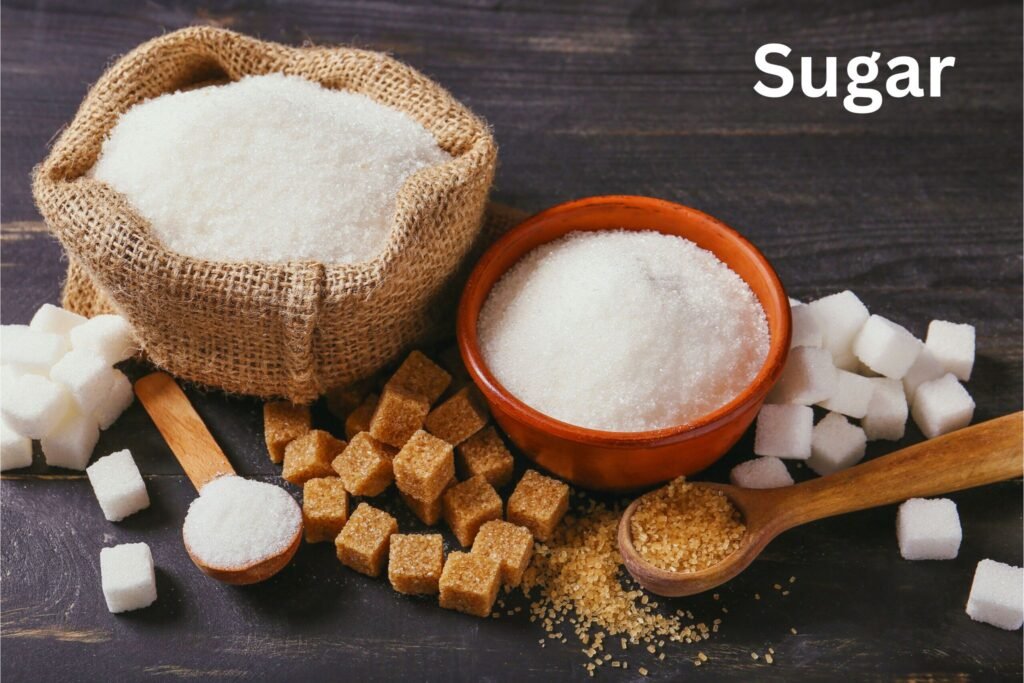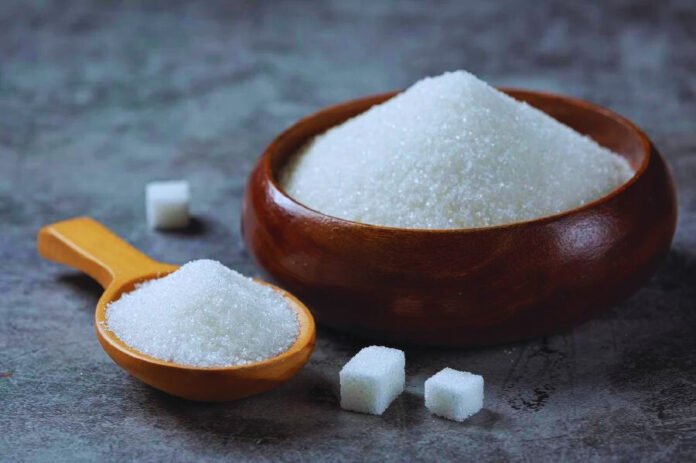Introduction:
While consuming a lot of added sugar might increase your risk of developing diabetes, sugar intake is only one factor to consider. Even yet, eating a lot of sugar on a regular basis increases your risk.
Diabetes risk is also influenced by a wide range of other variables, such as genetics, lifestyle, and general nutrition.
This article discusses how sugar contributes to the development of diabetes and offers advice on how to avoid it.

What is diabetes?
When your body is unable to properly control blood sugar levels, diabetes develops. This may occur when your cells grow resistant to insulin, your pancreas stops generating enough insulin, or both.
The hormone insulin is responsible for transferring sugar from the circulation into your cells. Chronically high blood sugar can occur if your body produces insufficient insulin or if you develop insulin resistance.
It’s critical to control blood sugar levels since prolonged high blood sugar can raise your risk of heart disease, neurological damage, and kidney damage.
Diabetes is primarily divided into two types:
- Type 1: Your immune system targets your pancreas, preventing it from producing insulin, resulting in an autoimmune illness.
- Type 2: Your body’s cells cease responding to the insulin your pancreas produces, or both, when it stops generating enough of it.
About 5–10% of diabetes occurrences globally are type 1 diabetes, which is a very uncommon form of the disease.
The majority of instances of diabetes are type 2 diabetes, which is the topic of this article. The main causes of it are lifestyle and food choices.
Does sugar increase your risk of diabetes?
Research indicates that drinking sugar-sweetened drinks on a frequent basis may raise your chance of developing type 2 diabetes.
Sugar consumption and the risk of diabetes were shown to be substantially associated, based on data from 175 nations. A high sugar diet raised the risk, but a low sugar diet decreased it.
These studies show a substantial correlation between sugar and diabetes, but they do not prove causation. Sugar, according to several studies, raises the risk of diabetes both directly and indirectly.
The effects of fructose on the liver may induce a direct increase in the risk of diabetes.
Consuming a lot of sugar can also increase the risk of diabetes indirectly by causing weight gain and increased body fat, which are two different risk factors for the disease.
The 2020–2025 Dietary Guidelines for Americans suggest that no more than 10% of your daily calories come from added sugars in order to lessen the negative consequences of excessive sugar consumption.
Natural sugars don’t have the same effect
Diabetes has not been associated with consuming excessive amounts of added sugars; however, this is not the case with natural sugars.
Fruits and vegetables naturally contain sugars; they are not added during production or processing. They’re less likely to trigger a blood sugar surge since they’re paired with fiber, water, and other nutrients, which slows down their digestion.
Additionally, compared to many processed meals, fruits and vegetables often contain significantly less sugar by weight, making it easier to control your intake.
Fruit juice
On whether consuming 100% fruit juice raises the risk of diabetes, research is conflicting.
Natural juice can raise blood sugar levels even if it is low in fiber and heavy in sugar. But if you pair it with sources of fat, fiber, and protein, blood sugar increases could be avoided.
Water or calorie-free drinks are suggested as fruit juice substitutes by the American Diabetes Association.
Natural sweeteners
Even while they are not as well processed as table sugar, some natural sweeteners like honey and maple syrup are still essentially pure sugar sources with very little fiber.
A lot of other sweeteners that are labeled as “natural” ought to be seen as added sugar as well. These consist of, among others, cane sugar, coconut sugar, and agave syrup.
Do artificial sweeteners increase diabetes risk?
Manufactured sweeteners are compounds with a sweet taste that are incapable of being broken down for energy. Their sweetness comes from them without any calories.
Despite not raising blood sugar levels, artificial sweeteners have been connected to type 2 diabetes and insulin resistance. Experts aren’t really sure why this is, though.
According to one view, eating more sugary meals is the result of having stronger desires for sweet foods caused by artificially sweetened items. Another theory is that because your brain equates the sweet taste of artificial sweeteners with zero calories, they interfere with your body’s capacity to sufficiently offset the calories from sugar.
It’s crucial to remember, though, that diet soda is still preferable than full-sugar drink for those who have diabetes.
How sugar is metabolized
Most people refer to sucrose, or table sugar, when they talk about sugar.
When you consume sucrose, your small intestine uses enzymes to separate the glucose and fructose molecules before absorbing them into your circulation. In addition to increasing blood sugar, this causes your pancreas to produce insulin. Insulin transports glucose into your cells so that it may be utilized as an energy source.
The bulk of fructose is transported to your liver, however it can also be absorbed by cells and utilized as fuel. There, it is either stored as fat or transformed into glucose for energy.
Triglycerides tend to rise in response to fructose consumption because it can be converted to fat. This might make fatty liver disease and heart disease more likely for you.
Higher blood levels of uric acid are also linked to a high fructose diet. You may have gout if these crystals of uric acid lodge in your joints. This is an excruciating ailment that results in joint discomfort and edema.
Other risk factors for diabetes
While eating a lot of added sugar is associated with a higher chance of developing diabetes, there are several other variables that also come into play, including:
- Body weight: Losing weight can lower your risk of type 2 diabetes, but research indicates that obesity is one of the main risk factors.
- Exercise: The risk of type 2 diabetes is about twice as high for sedentary individuals as for active individuals. You can lower your risk with just 150 minutes of moderate activity and up to three weight training sessions each week.
- Smoking: Compared to stopping, smoking can dramatically raise your chance of developing diabetes. However, after you stop, your risk almost returns to normal.
- Sleep apnea: One specific risk factor for diabetes is sleep apnea, a disease in which breathing becomes disrupted during the night.
- Genetics: Although the exact effect of genetics is unknown, having one or both of your parents have a higher chance of developing diabetes.
How to diet to reduce the risk of diabetes
Reducing your intake of added sugars is only one of several dietary adjustments you may make to lower your risk of diabetes:
- Consume a whole-foods-based diet: Research has shown that diets high in whole grains, nuts, fruits, vegetables, lean meats, and healthy fats lower the risk of diabetes.
- Coffee consumption: Getting your caffeine fix without adding any other ingredients may lower your chance of developing type 2 diabetes. Be careful what you add to your coffee drink because many popular beverages have a lot of added sugar.
- Consume enough of green leafy vegetables: Research has shown that a diet high in these veggies lowers the chance of developing diabetes.
Since sugar-sweetened drinks are the main source of added sugars in the typical American diet, cutting back on them might be a good place to start if cutting back on added sugars feels too drastic.
This one tiny adjustment may have a significant effect.
Because sugar is known by more than 50 names in food goods, it is also imperative that you carefully study nutrition labels. The first step to cutting back on your intake is to become aware of them.
You don’t have to feel deprived while eating a tasty, nutrient-dense diet since there are several strategies to cut sugar without sacrificing taste.


